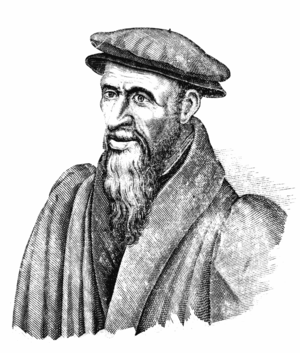
Guillaume Farel
1489–1565
The French Firebrand
By Johnathon Bowers
In a 1791 sermon, Lemuel Haynes remarked, “Nothing is more evident than that men are prejudiced against the gospel. It is from this source that those who are for the defense of it meet with so much contempt” (The Faithful Preacher, 25). The French Reformer Guillaume Farel knew his fair share of contempt.

A fervent gospel minister, Farel spent his days championing the Protestant cause, often in the face of opposition. At times, this opposition arose from true gospel prejudice. At other times, though, Farel’s own foolhardiness was to blame. John Calvin noted that Farel could sometimes get “carried away by the vehemence of his zeal” (Calvin, 152). Blending a headstrong temperament with a deep concern for biblical piety, Farel contended unflinchingly for the faith and was instrumental in the cause of early French reform.
“The Papacy Fell from My Heart”
Born in Gap, France in 1489, Farel grew up in a devout Catholic household. As a twenty-year-old, he enrolled at the University of Paris to study theology. While there, Farel encountered the humanist scholar Jacques Lefèvre d’Étaples, a man whose devotion to Christ inspired Farel.
After graduating in 1517, Farel began teaching at the Collège du Cardinal Lemoine. Reports of Luther’s reforming efforts in Germany reached him there, bolstering his own growing conviction that Catholic worship and teaching had strayed from their biblical roots. As he studied Scripture over several years, Farel found that “little by little the papacy fell from my heart” (William Farel, 26).
Farel resigned from his teaching position, and in 1521 he began to promote the message of reform wherever he could. He preached in France and in the French-speaking Swiss regions, crossing paths with Johannes Oecolampadius in Basel and Wolfgang Capito and Martin Bucer in Strasbourg. Farel was known for his confrontational style, which prompted the following warning from Oecolampadius: “the more you are prone to violence, the more you must work on being gentle and tone down your lion-like outbursts by the spirit of a dove” (William Farel, 38).
Calvin’s Co-Laborer
In 1533, after an unsuccessful visit the previous year, Farel took up residence in Geneva, intent on leading the city to adopt the Reformation. His hopes were realized in 1536 when the General Council of Geneva officially allied itself with Protestantism.
It was in that same year that Farel famously persuaded Calvin to join him in his work. Calvin was passing through Geneva on his way to Strasbourg, intent on a quiet life of scholarship. Farel learned of Calvin’s presence in the city and tried to convince him to stay. When gentler appeals proved unsuccessful, Farel threatened Calvin with God’s judgment. Farel’s words found their mark. Calvin later wrote, “By this imprecation I was so stricken with terror, that I desisted from the journey which I had undertaken” (William Farel, 69).
The decision to stay in Geneva was pivotal for Calvin, for although he and Farel were driven out of the city in 1538 — the two had clashed with the magistrates over church discipline matters — Calvin returned to Geneva in 1541 and ministered there for the rest of his life. Farel relocated to Neuchâtel, a city where he and Antoine Froment had introduced Reformation teaching in 1530. Like Calvin in Geneva, Farel established himself in Neuchâtel until his own death in 1565.
Calvin and Farel maintained a close relationship after their time together in Geneva, corresponding at least once a month for twenty years. The two men, together with Pierre Viret in Lausanne, formed a crucial partnership that helped advance the cause of French reform. Sadly, Calvin and Farel’s relationship ruptured when, in 1558, Farel announced his betrothal to Marie Thorel, a teenaged woman over fifty years his junior. Though it seems there was no sexual impropriety involved, the marriage created a scandal because of the vast age difference between the two spouses. Calvin’s friendship with Farel never recovered its former luster.
A Lover and a Fighter
As lion-like and controversial as Farel could be, he was committed to the spiritual vitality of the French-speaking people. He produced some of the first Reformation works available in French, writing a commentary on the Apostles’ Creed and the Lord’s Prayer in 1524 and a summary of Reformed teaching in 1529.
In his writings, Farel displayed a particular interest in the topic of prayer. In an article titled “Guillaume Farel’s Spirituality,” Theodore Van Raalte argues that Farel’s emphasis on prayer shows us a side of him that is too often overlooked, a side marked by “profound piety and pastoral love.” Farel was both a lover and a fighter, a pastor and a pugilist. Whatever his faults, this French firebrand loved the gospel and devoted his life to sharing its riches.
Recent Comments